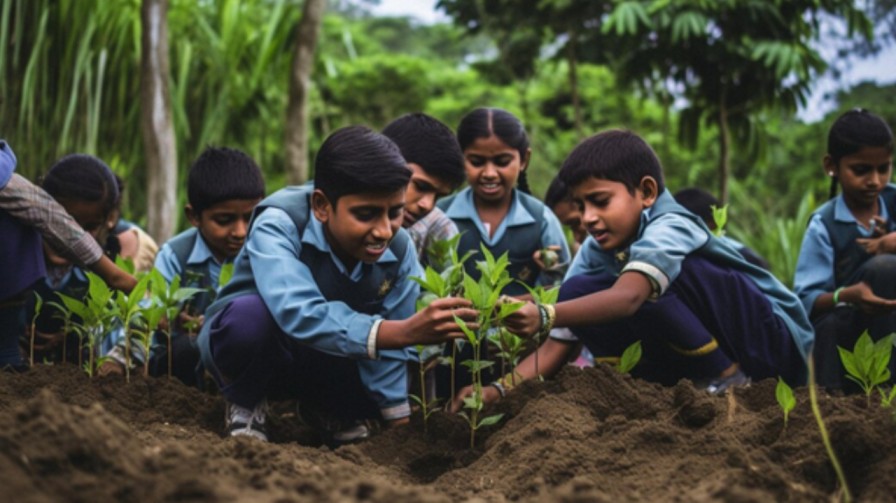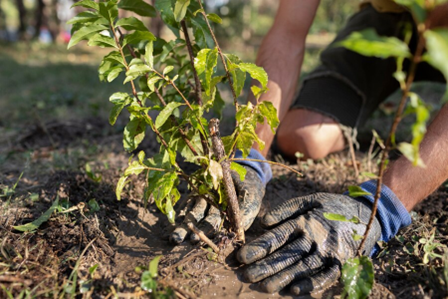Embracing Change: Fighting Global Warming Through Strategic Tree Plantation

In the array of environmental challenges humanity faces, few are as pressing and significant as global warming. This phenomenon evokes images of melting ice caps, rising sea levels, and extreme weather events. But what precisely is global warming, and how do we address it?
In this comprehensive exploration, we'll delve into its intricacies, root causes, and most importantly, the role strategic tree plantation plays in mitigating its impacts.
Understanding Global Warming:

Global warming refers to the long-term increase in Earth's average surface temperature, primarily due to human-induced greenhouse gas emissions. These gases, such as carbon dioxide (CO2), methane (CH4), and nitrous oxide (N2O), trap heat in the atmosphere, gradually warming the planet. While natural factors like volcanic eruptions and solar radiation contribute to climate variability, scientists agree that human activities, notably the burning of fossil fuels and deforestation, are the main drivers of recent global warming trends.
The Greenhouse Effect:
To understand global warming, we must first grasp the greenhouse effect. Certain gases in the Earth's atmosphere, like those in a greenhouse, permit sunlight to enter while trapping heat radiating from the planet's surface. This natural process regulates Earth's temperature within a habitable range. However, human activities have intensified the greenhouse effect by releasing large amounts of CO2 and other gases into the atmosphere. Consequently, Earth's natural heat balance is disturbed, leading to a steady rise in global temperatures.
The Role of CO2:
Carbon dioxide is the most prevalent and persistent greenhouse gas. Its sources range from burning fossil fuels for energy to deforestation and industrial processes. Since the Industrial Revolution, atmospheric CO2 levels have soared, reaching unprecedented concentrations not seen in millions of years. This accumulation of CO2 is the primary driver of global warming, contributing to approximately 80% of the enhanced greenhouse effect.
Consequences of Global Warming:
Unchecked global warming has numerous and far-reaching consequences, impacting ecosystems, communities, and economies globally. One immediate consequence is the disruption of weather patterns, resulting in more frequent and severe heatwaves, storms, droughts, and floods. Rising temperatures also exacerbate existing environmental challenges, such as melting polar ice caps, which leads to sea level rise and threatens coastal communities. Moreover, changes in precipitation patterns can disrupt agriculture, endangering food security for millions.
The Importance of Trees in Mitigating Global Warming:
Amidst dire projections and mounting challenges, trees offer hope. These silent guardians play a crucial role in mitigating global warming through carbon sequestration. Through photosynthesis, trees absorb CO2 from the atmosphere, storing carbon in their biomass while releasing oxygen. This dual benefit makes trees invaluable in the fight against climate change.
Strategic Tree Plantation Efforts:

One effective method to harness trees' climate-mitigating power is through strategic plantation efforts. By planting trees strategically in deforested areas, degraded lands, urban spaces, and along water bodies, we can maximize their carbon sequestration potential while enhancing biodiversity and ecosystem resilience. Strategic tree plantation also provides additional benefits, including soil erosion prevention, water retention, and habitat restoration.
Community-Led Initiatives:
Communities worldwide are taking proactive steps to combat global warming through tree plantation initiatives. From grassroots organizations to government agencies, there is growing recognition of the importance of community-led efforts in reforestation and afforestation projects. By involving local stakeholders, fostering partnerships, and using innovative financing mechanisms, these initiatives empower communities to take charge of their environmental future.
Corporate Responsibility:
Corporate entities have a critical role in addressing global warming through tree plantation efforts. Many companies are integrating reforestation into their corporate social responsibility (CSR) strategies, investing in tree planting projects to offset their carbon emissions and restore ecosystems. By aligning business interests with environmental sustainability, these companies mitigate their environmental impact while enhancing their brand reputation and stakeholder relations.
International Cooperation:
Global challenges like global warming require a coordinated, multilateral approach. International agreements such as the Paris Agreement provide a framework for countries to set emissions reduction targets, implement climate adaptation measures, and support sustainable development initiatives. Platforms like the United Nations Collaborative Programme on Reducing Emissions from Deforestation and Forest Degradation (UN-REDD) facilitate cooperation between governments, civil society, and the private sector to combat deforestation and promote sustainable forest management.
The Role of Individuals:
While governments, corporations, and international organizations have significant roles in combating global warming, individual actions are equally crucial. By making simple lifestyle changes such as reducing energy consumption, minimizing waste, and supporting sustainable products and practices, individuals can contribute to the collective effort to mitigate climate change. Moreover, individuals can directly support tree plantation initiatives through donations, volunteering, and advocacy, amplifying their impact on a grassroots level.
The Role of Aadivasi.org:
At Aadivasi.org, we are dedicated to harnessing the power of strategic tree plantation efforts to combat global warming and promote environmental sustainability. Through our platform, individuals can contribute to tree planting initiatives, support community-led reforestation projects, and make a tangible difference in the fight against climate change. By partnering with local organizations and leveraging technology, we aim to maximize the impact of our tree plantation efforts and create a greener, healthier planet for future generations.
Conclusion:
In conclusion, global warming presents a formidable challenge, with far-reaching implications for our planet's ecosystems, communities, and future generations. However, by embracing strategic tree plantation efforts, we can mitigate the impacts of climate change, restore degraded landscapes, and build a more resilient and sustainable world. Whether through community-led initiatives, corporate partnerships, or individual actions, each of us has a role to play in shaping a brighter, greener future. Together, let us plant the seeds of change and cultivate a world where trees flourish, and global warming becomes a distant memory.

